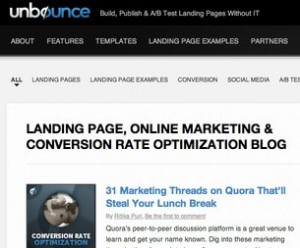Brands
The Big Presence of CrazyEgg’s Small Business Blog
This post is part of the Content Q&A Series, featuring interviews with top content strategists and bloggers about their work and insights about the industry.
Quiz question: only large national brands can have powerful voices, right? Hint: read the title of this blog post.

Russ Henneberry
Online content can exponentially boost a small business’s reach – just ask the editor of The Daily Egg, a blog that connects its audience of marketers and designers with Crazy Egg’s user experience research tool.
“Crazy Egg is website software that gives you a visual representation of where users click and what they do,” said Russ Henneberry, Crazy Egg’s content manager.
“It is a great tool for improving the conversion of a website. We launched our blog, The Daily Egg, during the first week of November 2011, so the blog is only over one year old,” he said.”In our first year, we had half a million visitors. Traffic growth has been on average 10 to 15 percent month over month, and subscriber growth really picked up at the six month mark.”
In addition to managing Crazy Egg’s content marketing strategy, he also consults for a range of small businesses through his company, Tiny and Mighty. Here’s what he’s learned.
Content Yields Revenue: Just Follow the Data
Content is more than just entertainment, according to Henneberry. It’s a way to build an engaged community that indirectly yields leads, referrals, and sales.
 “There are certainly aspects of business blogging that can be directly linked to revenue,” Henneberry said. “For example, on The Daily Egg, we have two calls-to-action to take the Free Trial of the CrazyEgg software for 30 days. These ads appear in the sidebar and at the top of each page on the blog.”
“There are certainly aspects of business blogging that can be directly linked to revenue,” Henneberry said. “For example, on The Daily Egg, we have two calls-to-action to take the Free Trial of the CrazyEgg software for 30 days. These ads appear in the sidebar and at the top of each page on the blog.”
Henneberry recommends that blog owners carefully track the user conversion funnel.
“Clicks on these ads lead to a landing page,” he said. “The landing page traffic either takes the free trial or doesn’t. And those that take the free trial either become paying customers, or they do not. These sales are directly attributable to the blog.”
Value Beyond Immediate Dollars
But companies need to review more than direct sales.
 “If direct sales were all you measured on a business blog, you would be missing a number of other benefits,” Henneberry said. “Some of which are very measurable like the number of inbound links, press mentions, or connections in social media. But other that are softer such as connecting with key influencers because you have a voice and an audience or building up social capital with customers and prospects in the market.”
“If direct sales were all you measured on a business blog, you would be missing a number of other benefits,” Henneberry said. “Some of which are very measurable like the number of inbound links, press mentions, or connections in social media. But other that are softer such as connecting with key influencers because you have a voice and an audience or building up social capital with customers and prospects in the market.”
Henneberry provides a rundown of important metrics to monitor on a monthly basis in this post.
Inspiration from the Community
When Henneberry needs inspiration, he turns to the strengths of his peers.
 “In the software space, I really love what Unbounce is doing with their content marketing,” Henneberry wrote. “They make particularly good use of their blog as a place to teach existing and prospective customers the best practices of landing page optimization, which by the way, is directly related to the software they create. The folks at Unbounce know that teaching existing customers to be more successful with their product is great for retention. And educating prospective customers about the benefits of landing page optimization is great for generating new sales.”
“In the software space, I really love what Unbounce is doing with their content marketing,” Henneberry wrote. “They make particularly good use of their blog as a place to teach existing and prospective customers the best practices of landing page optimization, which by the way, is directly related to the software they create. The folks at Unbounce know that teaching existing customers to be more successful with their product is great for retention. And educating prospective customers about the benefits of landing page optimization is great for generating new sales.”
Content marketing is as much about community and partner relationships as it is about great writing.
Bringing the Point Home: Niche Is Everything
Content gives small businesses a unique, competitive advantage, according to Henneberry.
“Big businesses are trying to act small online,” Henneberry said. “They want to ‘humanize’ their business by infusing individual personalities into their social media or blog content. Small businesses don’t have to act small. If you run a small business, don’t be afraid to let the individual personalities behind that business show in your content. For a great example of this, take a look at the blog from PegasusAblon, a real estate development firm, called Dallas Design District. Notice how the personality behind the blog, Kendall Schiffler permeates the entire blog.”
Look beyond resources and cash, recommends Henneberry.
“Small business will find that there is a disadvantage when it comes to resources,” he said. “A small business simply won’t have the cash or manpower that a larger business has. However, a small business can mitigate this weakness by taking on a small niche with their content strategy. For example, a small veterinary office might try building a content strategy around the goal of driving more customers with dogs. Or, to go even more niche it might be geared towards large dogs. If you focus your efforts, you can get by on fewer resources.”
Rely on your most valuable asset — your brand’s authenticity and voice.
Ritika Puri is a paid contributor to the CrazyEgg blog, and she works with Russ Henneberry. She did not receive compensation or editorial direction from Russ or CrazyEgg for this post.
Get better at your job right now.
Read our monthly newsletter to master content marketing. It’s made for marketers, creators, and everyone in between.




